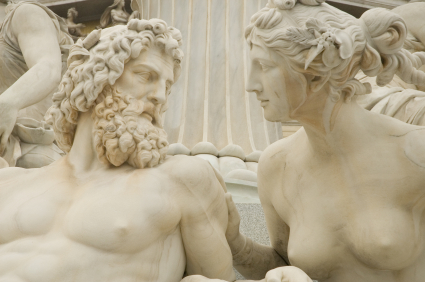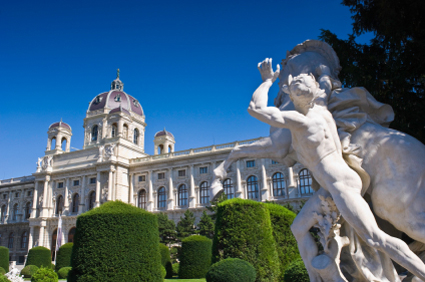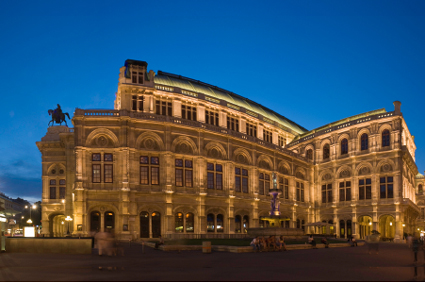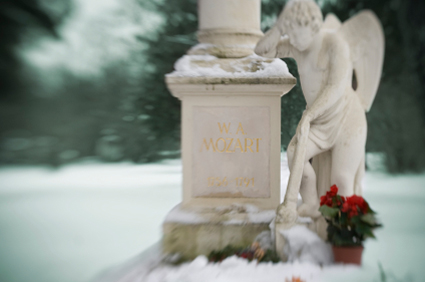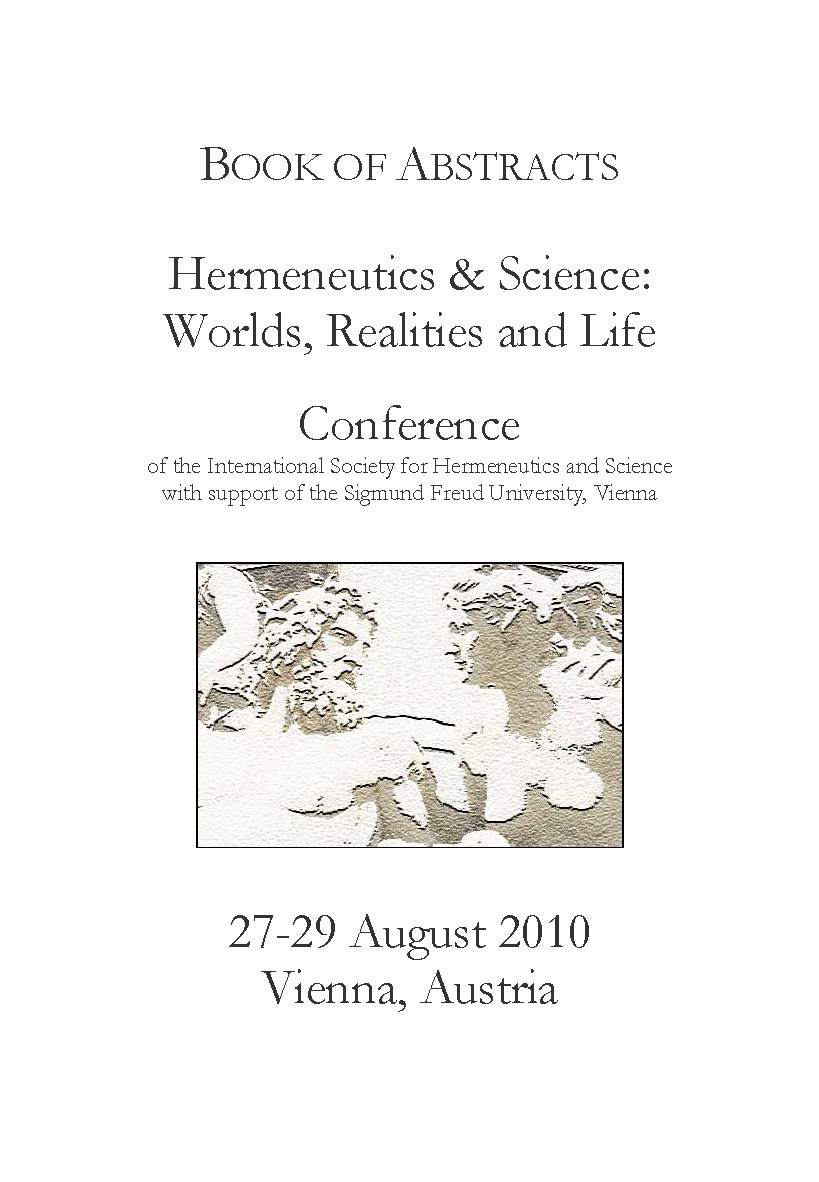Hermeneutics & Science: Worlds, Realities and Life
ISHS conference in Vienna
27-29 August 2010
Call for Papers
Heidegger’s and Gadamer’s philosophical hermeneutics provides an opportunity for developing a hermeneutic alternative to the analytic philosophy of science. This intellectual adventure has significant outcomes.Hermeneutics of science scrutinized the life world of scientists, the process of discovery, the structure of perception, scientists’ relatedness to the world, experimentation, scientific and technological tools, scientific debates, the reconstruction of scientific texts, and many others topics.
It shed new light e.g. on the issues about the philosophical foundations of Psychoanalysis. Heideggerian hermeneutics is also the basis of well known results in the Dasein analysis targeted the openness included in human Dasein, and aims to widen it via the analysis and develop self understanding and identity.
Taking the problems of hermeneutic philosophy of science into a broader philosophical context some fundamental epistemological problems can be identified. These dilemmas yield to the identification of the unnecessary domination of the so-called scientism in culture and provide a possibility to its critique.
It would be interesting to disclose the appearance the different forms of these problems in the practice of social and natural sciences, humanities, psychology, informatics and other forms of technology. This would be also an opportunity to confront philosophical ideas with everyday scientific and technological practice.
The aim of this conference is to provide an open and inspiring atmosphere to discuss all of these and related issues.
Possible topics for discussion includes:
- Reflections of scientists on their own praxis
- Creativity, innovation and re-interpretation
- Interpretation in History of Philosophy of Science
- Science as human enterprise/praxis
- Information and meaning: the question of interpretation.
- Open world hermeneutics: go beyond the “two cultures”.
- Life-world, systems and institutions
- Institutions, organisations and relationships
- What does it mean to live a fulfilled life?
- How to cope with uncertainty? Challenges of uncertainty in everyday life and science.
- Philosophical background of Dasein analysis
- Life technologies and human survival: human-environment relations.
- Varieties of relatedness to the world.
- Tools, toolmaking and technologies
- Embodiment and thinking.
- Scientific knowledge and experties
Contributed papers are invited in all topics related to the scope of the conference.
Please, send a one page abstract of your planned presentation to
ropolyi@ishs.hu and kissolga@ishs.hu by 15 May 2010.
The Scientific Commitee will decide about the acceptance of papers by the end of May 2010.
The accepted abstracts will be published in the book of abstracts distributed at the beginning of the meeting.
Conference Committees
SCIENTIFIC COMMITTEE:
Alfred Pritz, University Director,
Sigmund Freud University, Vienna, Austria
Giselher Guttmann, Vice-Director and Dean,
Sigmund Freud University, Vienna, Austria
Günther Fleck, Head of Division of Psychology, Institute for Human and Social Sciences,
National Defence Academy, Vienna, Austria
Paul Ertl, Head of Division of Philosophy, Institute for Human and Social Sciences,
National Defence Academy, Vienna, Austria
László Ropolyi, Department of History and Philosophy of Science,
Eötvös University, Budapest, Hungary
Olga Kiss, Institute for Political Science,
Budapest Corvinus University, Budapest, Hungary
Tihamér Margitay, Head of the Department of Philosophy and History of Science,
Budapest University of Technology and Economics, Budapest, Hungary
Tibor Schwendtner, Head of Institute of Philosophy,
University of Miskolc, Miskolc, Hungary
LOCAL ORGANIZING COMMITTEE:
Günther Fleck Head of Division of Psychology Institute for Human and Social Sciences National Defence Academy Vienna, Austria
guenther.fleck@bmlvs.gv.at
Phone: +43650 885 1912
Regina Hubmer (hotel reservation etc.) Sigmund Freud University
regina.hubmer@sfu.ac.at
Phone int.: +431 7984098 40
Veronika Neubauer (homepage) Sigmund Freud University
veronica.neubauer@sfu.ac.at

Program
Thursday, 26th of August
Icebreaker Party 19.30 o’clock
Sala Terrena, National Defence Academy, Vienna
Friday, 27th of August
09.00 Opening Ceremony and Welcome
09.30-11.00 – Dasein
- Archana Barua: An Attempt at Understanding Heideggerian Dasein
- Andreas Beinsteiner: Heidegger’s History of Being – Between Hermeneutics and Technodeterminism
- Éva Gedő: Heidegger’s Phenomenology and Daseinsanalysis
11.00-11.30 Coffee Break
11.30-13.00 – History and Culture
- Chandrima Christiansen: Technology and Culture Transfer: Hermeneutics and Philosophy of History
- Friedrich von Petersdorff: Uncertainty within History and Historiography
- Wan Fariza Alyati Wan Zakaria: Hermeneutics, Tafsīr and the Future of Theological Interpretation
13.00-14.30 Lunch
14.30-16.00 – Technology
- April Elisabeth Pierce: Representation, Concealment, and Techne: 21st Century Reimaginings of Heidegger’s Work
- Arun Kumar Tripathi: Culture of Embodied Skills in Human-Computer Interaction How Embodied Users deal with Embedded Computers
- Michele Rapoport: Domestic Hybrids: ‘Smart Homes’ At The Juncture Of Man And Technology
16.00-16.30 Coffee Break
16.30-18.00 – Cognition
- Günther Fleck: Scientific Thinking and its Mental Infrastructure
- Ananya Barua: Disembodied Thinking and its Critics
- Péter Érdi: The Schizophrenic Brain: A Broken Hermeneutic Circle
18.30-19.20 Keynote Address by Patrick Heelan: Hermeneutic Consciousness, Perception and Natural Science
Saturday, 28th of August
09.00-09.50 Keynote Address by Dimitri Ginev:
Critical Aspects of the Hermeneutic Philosophy of Science (the Politics of Hermeneutic Realism)
Parallel Session 1
10.00-11.30 – Hermeneutics and Science
- Alexander Nesterow: Wissenschaftliche Hermeneutik: zwischen Verstehen und Interpretieren
- Roberto Wu: Perspectives about Hermeneutics, World and Science
- Duane J. Lacey: Hermeneutics of the Graeco-Arabic ’Translation Movement
Parallel Session 2
10.00-11.30 – Realism
- Jeff Kochan: Why Heidegger Was Not a Robust Realist: A Response to Dreyfus and Spinosa
- Roberto Di Letizia: Radical Embodied Realism: A Nonrepresentational Ontology
- Daniel Golden: Epistemology, Hermeneutics and Richard Rorty
11.30-12.00 Coffee Break
Parallel Session 1
12.00-13.30- Society
- Shahzad Shafqat: Interpreting Notions of Extremism – When the Search for Certainty Leads to More Uncertainty
- Abolfazl Gaeini: A Search into Meaningfulness of Employees’ Behaviors
- Paul Ertl: Hermeneutics and Ethics: Open and Closed world-concepts as Generators of Applied Ethics
Parallel Session 2
12.00-13.30. – History of Philosophy
- Balázs Mezei: Husserl Platonicus
- Dana Zahan: Discourse and Dialogue in Seneca
13.30-15.00 Lunch
15.00-23.00 – Social Program
Includes the Keynote Address by Dagmar Eigner: Hermeneutics of Shamanism
Sunday, 29th of August
09.00-09.50 Keynote Address by Babette Babich: Towards a Critical Philosophy of Science
10.00-11.30 – Hermeneutics and Science
- Simon Glynn: The Double Hermeneutic of the Natural Sciences: From Perception and Description, to Prediction, Explanation and Understanding
- Hans Diebner and Werner Pabst: Systems Theory as Touchstone for Hermeneutics and Arts in Science
- László Ropolyi: Contextualizing the Hermeneutic Philosophy of Science
11.30-12.00 Coffee Break
12.00-13.30 Hermeneutics, Science and Technology
- Peter Bujňak: Hyperlinked Knowledge
- Bart Gremmen: No Future: the Ethics of Emergent Science and Technology
- Barbara Zahnen: Hermeneutic Phenomenology, Physical Geography and Risks
13.30-15.00 Lunch
15.00-16.30 – Hermeneutics of Sciences
- Makoto Katsumori: Heisenberg’s Approach to Complementarity and the Order of Reality
- László Székely: Einstein’s Time in Heidegger’s Context
- Olga Kiss: Plato, Rényi, Lakatos: Dialogues on Mathematics
16.30-17.00 Coffee Break
17.00-18.30 Round Table on the Future Activity of the ISHS
18.45 Closing Ceremony
DOWNLOAD THE BOOK OF ABSTRACTS by clicking on the image.
Accommodation
Hotels next to the Sigmund Freud University
Vienna Sporthotel,
Baumgasse 83
A-1030 Wien
Tel.: +43 1 798 82 01
E-Mail: info@vienna.sporthotel.at
website: http://of000043.host.inode.at/viennash/
Prices: 90-150 EUR/night
ETAP-Hotel
Wien St. Marx
Franzosengraben 15
A-1030 Wien
Tel.: +43(0)1/798 45 55
website: http://www.etaphotel.com
Prices: 45 EUR /night .
Please, reserve your rooms as soon as possible because there are only very limited number of rooms available. (At these hotels reservation code: ishs 2010.)

